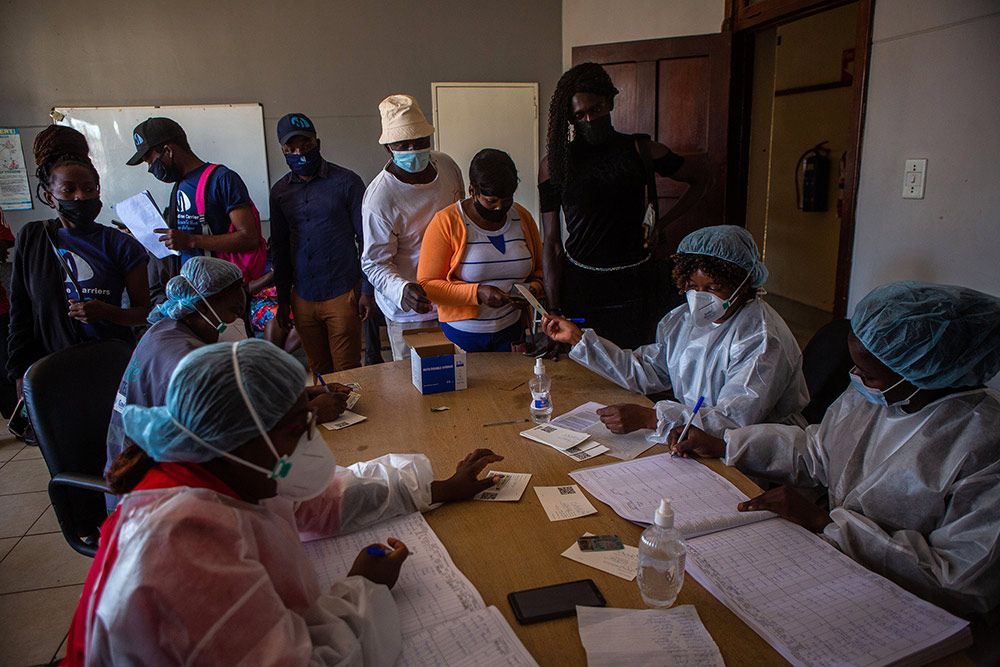
新冠疫苗的分发情况揭示了全球范围内根深蒂固的不平等现实。根据今年早些时候发表于《柳叶刀》(The Lancet)的一项分析,2021年,占全球人口约16 %的高收入经济体已经锁定了五种主要新冠疫苗70%以上的供应剂量。
但是,发达国家囤积疫苗并不是疫苗公平分配的唯一阻碍。不平等地区的疫苗腐败问题进一步加剧了这种不平等,也加深了国际社会的公共卫生危机。
先前,腐败问题就通常会导致不良的社会健康状况——尽管能够说明这一点的有力证据很少。一项发表于期刊《经济学与金融学》(Journal of Economics and Finance)、基于64个国家的分析表明,腐败会稀释原本用于急需的基本公共服务的资金,包括医疗保健。一组基于菲律宾80个城市的计量经济分析数据显示,腐败与免疫接种率有很强的负相关性,和新生儿免疫接种延迟有正相关性。同样,一项基于非洲多国的分析也提出假设称,腐败问题和获得新疫苗的滞后性之间存在关联。
一大波疫苗腐败丑闻也破坏了全球的疫苗分发秩序。在许多中低收入国家,政客和高级官员滥用权力,“插队”接种疫苗。比如秘鲁的高级政客在疫苗于本国上市前好几个月就打到了。
此外,据报道,政客们还会通过疫苗来贿赂人们的选票。在黎巴嫩就有人指控称,政治领导人为他们的选民安排了私人疫苗接种活动,以帮助他们当选。
关于疫苗走私的报道也浮出水面。菲律宾总统的安全官就接种了走私的新冠疫苗,而这得到了该国国防部长的证实,称这是“合理合法的”。
此外,还有报告称,一些负责疫苗分发的人也在侵吞疫苗。在印度尼西亚,一名狱医和另外三人就因为盗窃疫苗而遭到指控,他们偷走了1000多剂原本为狱中囚犯准备的疫苗,并按每剂约17美元的价格出售。
这种腐败也为黑市交易创造了有利的环境。今年年初,卡巴斯基(Kaspersky)报告称,辉瑞(Pfizer)/BioNTech、Moderna、牛津大学(Oxford)/阿斯利康(AstraZeneca)的疫苗都有在暗网上出售,价格从250美元到1200美元不等。4月,墨西哥警方通报称,一家诊所以每支1000美元的高价,给80人注射了含有蒸馏水的针剂。令人担忧的是,还有人在卖假冒的疫苗接种证。在津巴布韦,一名护士与黑贩勾结,将每张接种证明卖到25美元至50美元。
这些可鄙的做法可能会威胁到全球卫生工作,扩大疫苗不平等的鸿沟。这种腐败行为也违背了世界卫生组织(WHO)的章程——“确保将疫苗优先供给最需要的人”。
疫苗腐败也打击了公众的信心,加深了他们对公共机构的不信任,而这又可能转化为他们在“是否要接种疫苗”时犹豫迟疑,减少疫苗接种覆盖率,进一步扩大疫苗缺口。此外,对假冒的疫苗接种证和非法来源疫苗的需求不断增加,还可能引发疫苗不平等和腐败的恶性循环。
也许更令人担忧的是,疫苗腐败的参与者还可能成为病毒携带者、危害人们为遏制病毒传播付出的努力,特别是在欧盟(European Union)等地区,原本计划通过“疫苗护照”推动跨境旅行常态化。
全球的合作对根除这种腐败至关重要。同时,地方政府、企业、“吹哨人”也可以联合起来,共同打击黑市。
各级政府还应该积极加强监督和问责进程。他们还应该考虑采用使用二维码和区块链的疫苗追踪和认证系统。此外,还要开展公共运动,提高人们对疫苗腐败问题及其法律后果的认识。
疫苗公平对成功遏制这场疫情至关重要。用诗人、哲学家阿拉玛•穆罕默德•伊克巴尔爵士的话说:“没有统一的行动,只有统一的思想是不完美的。”(财富中文网)
穆罕默德•贾瓦德•努恩是一名医务工作者,也是哥廷根大学(Georg August University of Goettingen)的经济学研究员。他在2020年获得德国医学奖(German Medical Award)。
编译:陈聪聪
新冠疫苗的分发情况揭示了全球范围内根深蒂固的不平等现实。根据今年早些时候发表于《柳叶刀》(The Lancet)的一项分析,2021年,占全球人口约16 %的高收入经济体已经锁定了五种主要新冠疫苗70%以上的供应剂量。
但是,发达国家囤积疫苗并不是疫苗公平分配的唯一阻碍。不平等地区的疫苗腐败问题进一步加剧了这种不平等,也加深了国际社会的公共卫生危机。
先前,腐败问题就通常会导致不良的社会健康状况——尽管能够说明这一点的有力证据很少。一项发表于期刊《经济学与金融学》(Journal of Economics and Finance)、基于64个国家的分析表明,腐败会稀释原本用于急需的基本公共服务的资金,包括医疗保健。一组基于菲律宾80个城市的计量经济分析数据显示,腐败与免疫接种率有很强的负相关性,和新生儿免疫接种延迟有正相关性。同样,一项基于非洲多国的分析也提出假设称,腐败问题和获得新疫苗的滞后性之间存在关联。
一大波疫苗腐败丑闻也破坏了全球的疫苗分发秩序。在许多中低收入国家,政客和高级官员滥用权力,“插队”接种疫苗。比如秘鲁的高级政客在疫苗于本国上市前好几个月就打到了。
此外,据报道,政客们还会通过疫苗来贿赂人们的选票。在黎巴嫩就有人指控称,政治领导人为他们的选民安排了私人疫苗接种活动,以帮助他们当选。
关于疫苗走私的报道也浮出水面。菲律宾总统的安全官就接种了走私的新冠疫苗,而这得到了该国国防部长的证实,称这是“合理合法的”。
此外,还有报告称,一些负责疫苗分发的人也在侵吞疫苗。在印度尼西亚,一名狱医和另外三人就因为盗窃疫苗而遭到指控,他们偷走了1000多剂原本为狱中囚犯准备的疫苗,并按每剂约17美元的价格出售。
这种腐败也为黑市交易创造了有利的环境。今年年初,卡巴斯基(Kaspersky)报告称,辉瑞(Pfizer)/BioNTech、Moderna、牛津大学(Oxford)/阿斯利康(AstraZeneca)的疫苗都有在暗网上出售,价格从250美元到1200美元不等。4月,墨西哥警方通报称,一家诊所以每支1000美元的高价,给80人注射了含有蒸馏水的针剂。令人担忧的是,还有人在卖假冒的疫苗接种证。在津巴布韦,一名护士与黑贩勾结,将每张接种证明卖到25美元至50美元。
这些可鄙的做法可能会威胁到全球卫生工作,扩大疫苗不平等的鸿沟。这种腐败行为也违背了世界卫生组织(WHO)的章程——“确保将疫苗优先供给最需要的人”。
疫苗腐败也打击了公众的信心,加深了他们对公共机构的不信任,而这又可能转化为他们在“是否要接种疫苗”时犹豫迟疑,减少疫苗接种覆盖率,进一步扩大疫苗缺口。此外,对假冒的疫苗接种证和非法来源疫苗的需求不断增加,还可能引发疫苗不平等和腐败的恶性循环。
也许更令人担忧的是,疫苗腐败的参与者还可能成为病毒携带者、危害人们为遏制病毒传播付出的努力,特别是在欧盟(European Union)等地区,原本计划通过“疫苗护照”推动跨境旅行常态化。
全球的合作对根除这种腐败至关重要。同时,地方政府、企业、“吹哨人”也可以联合起来,共同打击黑市。
各级政府还应该积极加强监督和问责进程。他们还应该考虑采用使用二维码和区块链的疫苗追踪和认证系统。此外,还要开展公共运动,提高人们对疫苗腐败问题及其法律后果的认识。
疫苗公平对成功遏制这场疫情至关重要。用诗人、哲学家阿拉玛•穆罕默德•伊克巴尔爵士的话说:“没有统一的行动,只有统一的思想是不完美的。”(财富中文网)
穆罕默德•贾瓦德•努恩是一名医务工作者,也是哥廷根大学(Georg August University of Goettingen)的经济学研究员。他在2020年获得德国医学奖(German Medical Award)。
编译:陈聪聪
The coronavirus vaccine rollout has unveiled deep-rooted inequities on a global scale. According to an analysis published in The Lancet earlier this year, high-income economies with around 16% of the world’s population have secured over 70% of doses of the five major coronavirus vaccines for 2021.
But rich countries’ hoarding is not the only problem hampering vaccine distribution and equity. Vaccine corruption in the Global South is further fueling vaccine inequity, deepening the international health crisis.
Previously, corruption has been linked with adverse health outcomes, although robust evidence is scarce. A 64-country analysis published in the Journal of Economics and Finance suggests that corruption diverts funds from much-needed investment in essential public services, including health care. An econometric analysis of data from 80 municipalities in the Philippines reveals that corruption has a strong negative correlation with immunization rates and a positive correlation with vaccination delay in newborns. Likewise, a multicountry analysis from Africa hypothesizes a link between corruption and delay in the introduction of new vaccines.
A wave of vaccine corruption scandals have shaken the global COVID-19 vaccine rollout. In numerous low- and middle-income countries, politicians and high-ranking officials have abused their power to cut the vaccine queue. For instance, the Peruvian political elite received the jab months ahead of the national vaccine rollout.
Moreover, politicians are reportedly offering vaccine bribes to lure people into voting for them. In Lebanon, political leaders have arranged private vaccine drives for their constituents, allegedly to help get elected.
Reports of vaccine smuggling have also surfaced. The Philippine President’s security aides were inoculated with smuggled coronavirus vaccines, confirmed the country’s defense secretary, calling it “justified.”
Furthermore, there have been reported cases of vaccine theft by people in positions of responsibility. In Indonesia, a prison doctor and three others were charged for stealing more than 1,000 vaccine doses meant for prison inmates and selling them for about $17 each.
Such corruption creates a conducive environment for black market activity. Earlier this year, Kaspersky reported Pfizer-BioNTech, Moderna, and Oxford-AstraZeneca vaccines being sold on the dark web, with prices ranging from $250 to $1,200 per dose. Mexican police in April uncovered a clinic that gave 80 people shots containing distilled water for $1,000 each. Alarmingly, fake vaccination certificates are also for sale. In Zimbabwe, a nurse colluded with a pest controller to sell them for $25 to $50 each.
These despicable practices can be crippling to the global health effort and contribute to the vaccine divide. Such corruption breaches WHO protocols developed to ensure those who need vaccines most get them first.
It also undermines confidence in public institutions. Mistrust in institutions may translate into vaccine hesitancy and a decrease in vaccination coverage, further widening the vaccine gap. Moreover, rising demand for fake vaccination certificates and illegally acquired shots can trigger a vicious cycle of vaccine inequity and corruption.
Perhaps even more worryingly, individuals partaking in vaccine corruption can serve as virus carriers. This may have detrimental consequences for efforts to stem virus spread, especially with regions like the European Union planning to normalize cross-border travel using vaccine passports.
Global partnership is critical to uprooting this corruption. At the same time, local governments, businesses, and whistleblowers can work together to crack down on black markets.
All levels of government should actively work on strengthening oversight and accountability processes. They should also consider employing vaccine tracking and certificate authentication systems using QR codes and blockchains. In addition, they should develop public campaigns to raise awareness around the issue and the legal consequences of corruption.
Equitable vaccine access is paramount to successfully contain the pandemic. To quote the poet-philosopher Allama Sir Muhammad Iqbal, “Unity of thought without unity of action is imperfect.”
Muhammad Jawad Noon is a medical doctor working as a research fellow in economics at Georg August University of Goettingen. He was a recipient of the German Medical Award in 2020.






